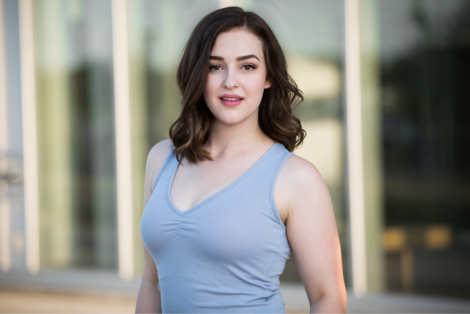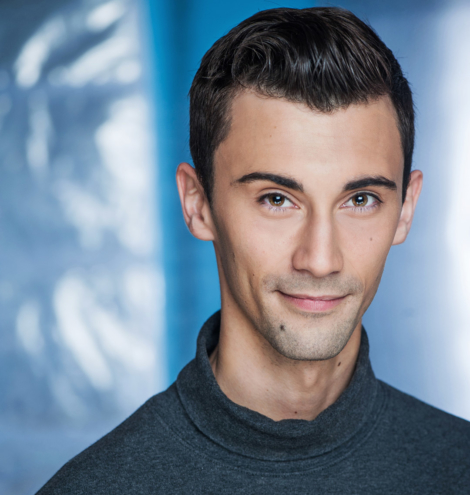From September 21 to October 6, the dark teen comedy Heathers: The Musical will be performed in Hart House. Heathers celebrates its 30th anniversary this year; when it was first released in 1988, it was groundbreaking with its discourse surrounding contemporary topics.
The Varsity sat down with Justan Myers and Emma Sangalli to discuss character development, gun violence, and performing in the historic Hart House.
The Varsity: For both of you, this is your first time working at Hart House Theatre — what is that like? It’s a historic space; how has the process been?
Justan Myers: Working in this space is incredible. I’ve been mostly in Toronto working in smaller blackbox-esque theatres, so it’s great to have this wide open space. There’s so many different ways to use it, and with our incredible set, just finding so many cool ways to bring the audience into the world has been really fun.
Emma Sangalli: It feels like a real established theatre. It’s old, you can feel the history, and that’s beautiful just knowing there have been so many passionate artists in this building doing what we’re doing. And our director has been using it very creatively.
Justan Myers: It’s really cool to have that juxtaposition of how old and how experienced the space is versus how many emerging artists are in this production — kind of that combination of youth and freshness, but then also this foundation.
TV: Can you tell us a little bit about the characters you’re playing?
JM: So, I play Jason “JD” Dean. He’s the typical social outcast — he’s moved schools a lot and he doesn’t have any friends, so Veronica sort of captures his attention. Little does she know that he has a lot of unresolved problems from both his childhood and the way he’s grown up that leads him to influence her into some bad decisions later on in the show.
ES: Yeah, Veronica is not popular at the start of the show — she’s kind of dorky, very smart, a little bit of an old soul. She ends up becoming popular and her whole story is kind of discovering the cost of popularity, I would say, and realizing it’s not worth it.
TV: This play is based on a film, the 1988 cult classic, Heathers, which many people say played a role in defining its generation. Are you looking to the movie, or past productions, to inform your rehearsal process?
JM: Yes and no. The characters are so much more fleshed out in the musical that it’s really its own work in a sense. I know my character changed a lot, because in the movie he’s a little 2D. They don’t give him a lot of super relatable moments. In the musical, they gave him more backstory, something for the audience to grab onto. So, in a sense, yes, because there’s so many of those iconic lines they took from the movie that you want to nail because the audience just knows them, but the character work itself had to come more from our own basis.
ES: At the end of the day, the part of you that’s an actor and the part of the character that you find through research just sort of come together, and you’re able to find the thread. It’s a little difficult, because the movie was quite a bit different from the musical in terms of, I would say, undertone. In the movie, there’s a little bit of ambiguity on whether [Veronica] is a good guy or a bad guy until closer to the end. Whereas in the musical, she’s kind of the belle of the show, as our director likes to say. It’s pretty clear that she’s got a strong moral compass from the beginning. So definitely we had to look at as much source material as we could find, but you also have to dive into the text that the writers of the musical give you and flesh out the characters on the page, because it really is quite a bit different from the movie.
TV: Was there any moment during rehearsals when you had to really step out of your comfort zone or do something you’d never done?
ES: One of the most famous songs in the show is “Dead Girl Walking.” For me in terms of comfort it was definitely a step, because I have never played a romantic role and it’s basically a full, simulated sex scene onstage. So, it’s very much like, we had to come into rehearsal with all our guards down — throw those fears out the window, be a professional actor, and just do it. But it’s so nice working with Justan, because I’m so comfortable with him.
TV: This show deals with a lot of really pressing contemporary issues like bullying and suicide — who do you hope sees this show? What would you want them to take away from it?
JM: I think it is very important for teens to see this show, especially with increasing gun violence and hate crimes and things like that. It’s so easy to become desensitized to that because of media and everything, so to just get a real — I mean, ‘real,’ it’s a musical — but [it’s] a more grounded perspective of what these issues are.
ES: It’s funny because when you think about Heathers, you wouldn’t think of words like ‘solution’ and ‘hope,’ but that was something I really took from the writers’ notes of the musical — that’s really what it’s about, solutions and hope, and it really tries to answer all of the problems that it brings up. I think it’s important for anyone to see this show. There are people that maybe shouldn’t see this show, because there’s a lot of heavy stuff in it, but it is cushioned by humour and by good-heartedness. I think it’s an important story for this day and age, and for this city specifically. For Toronto in the last year, a lot of stuff has happened and because of social media we all know about it right away. It’s hard when you go on social media and all you see is another shooting, another truck driver. We all care, and want to do something, but sometimes we don’t know what to do .
JM: It feels bigger than us.
ES: I think the beauty of this show is that it boils it down to a very simple solution: be kind to the person next to you, offer them a hand, and include them. That’s a big one in this show. Be a friend, you know? That’s something very tangible, that we can all do every day, that will hopefully help change the amount of bad things we see happening. So, in that case, I do think it’s really important for anyone who can handle this type of subject matter to come see it, because it really does give you some inspiration, and also some tools to go out into the world and make it beautiful.
This interview has been edited for length and clarity.




